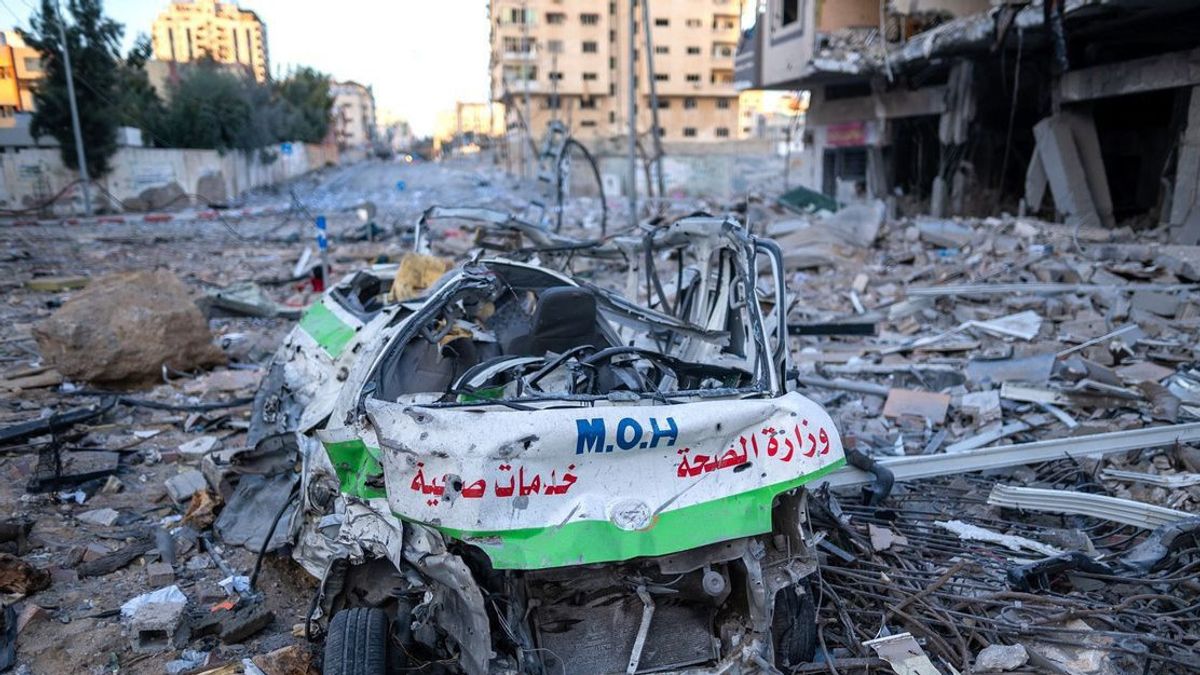JAKARTA - The 24-hour deadline set by the Israeli Armed Forces (IDF) for residents of northern Gaza to move to the southern part of one of the Palestinian enclaves, apart from the West Bank, has passed.
According to Israel, around 600 thousand Gaza residents have moved from north to south. That number is half of the total population of Gaza.
As reported by ANTARA, Monday, October 16, the IDF will attack the city to eliminate the Palestinian resistance group, Hamas, in the aftermath of the deadly attack on October 7, which killed thousands of Israelis and hundreds of others who were used as human shields by Hamas.
The United Nations (UN) and the World Health Organization (WHO) have urged Israel to revoke the evacuation order because it has the potential to create a devastating humanitarian disaster.
The distance from Gaza's northernmost point at the Beit Hanoun Crossing, to Wadi Gaza in the south is 17 km.
It's close, only a four hour walk, but that's under normal circumstances. Imagine, if 1.2 million people had to move within 24 hours, including the elderly, sick people and children.
In fact, the European Union considers the evacuation order unreasonable. Meanwhile, Arabs and Palestinians are reminded of the forced displacement in 1948 which resulted in them being driven from their own land.
Now, Israel is preparing to launch a ground attack, which they have launched twice in their four previous wars against Hamas.
By activating 300 thousand reserve troops, alerting battle tanks along the Gaza-Israel border, and having trained to face fierce urban warfare, Israel's determination is firm.
The country with the fourth largest military power in the Middle East, after Turkey, Egypt and Iran, wants to eliminate Hamas from its roots, so that it no longer poses a threat.
Apart from knowing that it faces difficult conditions for its citizens held hostage by Hamas, Israel understands that it will face fierce resistance from Hamas, which for years has been building tunnels and traps as a precaution against possible Israeli attacks.
Hamas leaders admitted that more than a year ago they had planned an infiltration operation into Israel. They also prepared scenarios for various possible Israeli counterattacks, including a ground offensive.
Hamas may have been waiting for this decisive moment when politically they were on the verge of being "forgotten" by their allies who one by one Israel managed to approach.
Deeply rooted
Hamas probably knows that victory will be difficult for a country that has 1,000 Merkava battle tanks and 350 advanced fighter aircraft. However, Israeli soldiers who will be forced to carry out door-to-door operations also face a huge risk of death, especially as they may have to fight for months in Gaza.
Hamas and other Palestinian resistance groups know that the Israeli people are sensitive to heavy casualties on their side. The large number of casualties will put great pressure on the Israeli leadership.
Hamas itself is not an ordinary resistance group, whose reputation for fighting is good, which Israel itself recognizes.
Different from other Palestinian resistance groups, Hamas is deeply rooted in Palestinian society, because it is considered the most reliable, not only by those in the Gaza Strip, but also those in the West Bank and other places where the diaspora is located.
Hamas has this reputation because they have an organized armed force, are able to run an effective government in Gaza and are skilled at advancing social welfare programs that other Palestinian groups, including Fatah, cannot do.
So entrenched, Hamas inspires and encourages Palestinians in the West Bank in resisting the provocations of Israeli right-wing extremists in the occupied areas and the Al-Aqsa compound, in east Jerusalem.
Since its founding in 1987, Hamas has continued to withstand periodic Israeli attacks. In fact, since Israel's blockade in 2007, they have been successfully weakened by Israel.
Even if it succeeds in occupying the Gaza Strip, Israel faces two big problems, namely quelling the rebellion of the remnants of Hamas and other groups, including Islamic Jihad, and the hardest part, having to meet and serve the basic needs of 2.3 million Palestinians.
Moreover, by eliminating Hamas, Israel will create a power vacuum in Gaza that is impossible to fill with other, more militant and radical groups.
It is possible that every party that wins or benefits from the destruction of Hamas will be considered a traitor or stooge of Israel by the Palestinian people. If that is the case, the war will not change the face of Palestine, especially Gaza.
"Israel may be able to eliminate Hamas, but they will not be able to solve the basic problems in Gaza," said H.A. Hellyer, from the British defense think tank, Royal United Services Institute (RUSI), as quoted by AP.
Another difficulty facing Israel is that there are few countries that truly fully support them in Gaza. Such a situation has never occurred in previous wars against Hamas.
In fact, Israel's most loyal ally, the United States, could change its view if Israel's ground offensive worsens the humanitarian situation in Gaza. There would be tremendous public pressure in Israel's allied countries if the ground offensive claimed a very large number of civilian casualties or created an acute humanitarian tragedy.
May Spread
Not surprisingly, Israel is desperately calling on Gaza residents to leave the northern area so that the ground offensive does not cause large numbers of civilian casualties. This is more because Israel is worried that international public pressure on its allies could backfire on the success of Israel's military operations in Gaza.
What would be no less terrifying if this scenario were to occur would be the proliferation of radicalism and the revival of terror cells which often exploit the Palestinian issue.
An immeasurable ground offensive, resulting in huge civilian losses, could give radical fanatics an excuse to launch terror on a wide scale, as happened last year, which would certainly trouble countries that are Israel's allies.
What also needs to be taken into account is the possibility of Hamas' allies creating another war front, even though the IDF has stated that Israel is capable of fighting on two fronts at once.
Among those most likely to get involved in the Hamas-Israel war is Hezbollah, which is said to have 100 thousand trained soldiers and 150 thousand guided missiles.
Hezbollah is a much more formidable enemy than Hamas. They are even more terrifying because they were forged by various battlefields, including the civil war in Syria, where they became one of the supports for the power of President Bashar al-Assad's regime.
The Iran-backed Shia group based in Lebanon cannot imagine life without a resistance patron in Palestine. The destruction of Hamas will leave Hezbollah alone to face Israel, opposition to Israel has become one of their political platforms.
Israel may still remember the fierce month-long war in 2006 which reached a stalemate, so the war ended in a ceasefire.
If Hezbollah joins the war, Iran, which sponsors Hezbollah, will most likely join in. In fact, this is a moment that allows Iran to show regional leadership when the Arab world tends to be passive. Iran also does not want to see Hamas erased from regional geopolitics.
However, Iran also encouraged the United States to alert two aircraft carriers in the Mediterranean Sea off the coast of Gaza, Israel and Lebanon, to prevent Iran and its proxies in Syria and Lebanon from opening another war front.
As a result, what was previously Hamas's conflict with Israel could develop into a conflict that drags in regional powers, including the US, and even Russia, which is bound by a 2017 agreement with Syria that makes Tartus a base for 11 Russian warships.
All these situations endanger world politics already exhausted by the Ukraine-Russia war, and other conflicts, including in the Middle East.
Israel may be forced to calculate even harder considering the global situation, so as not to make a wrong move that could put its allies in a difficult position, even though it is unlikely that the country will cancel its ground offensive on Gaza.
The English, Chinese, Japanese, Arabic, and French versions are automatically generated by the AI. So there may still be inaccuracies in translating, please always see Indonesian as our main language. (system supported by DigitalSiber.id)









